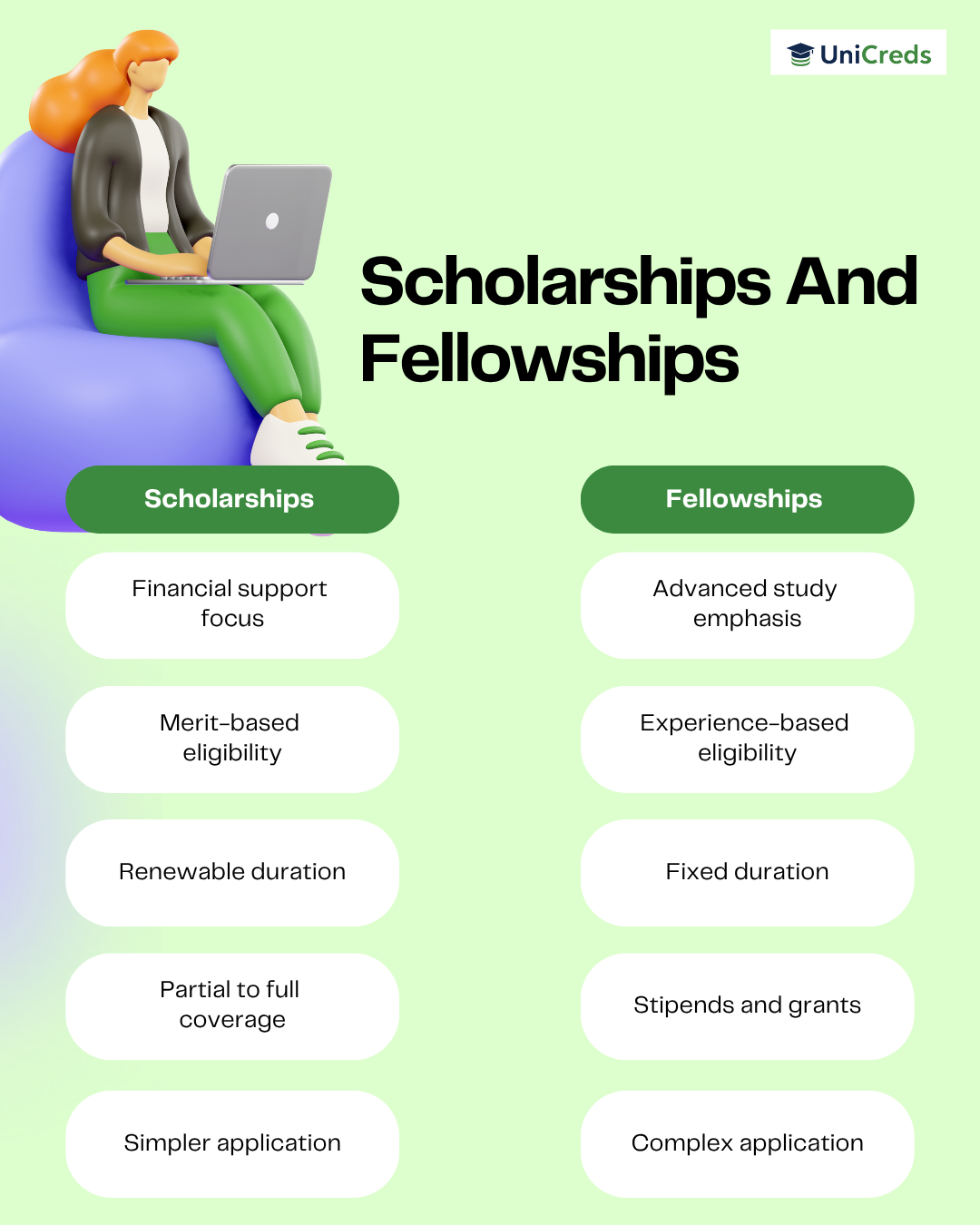Table of Contents
Financing higher education can be one of the biggest challenges for students aspiring to study in top universities around the world.
Scholarships and fellowships are two of the most effective ways to reduce costs while gaining recognition for academic excellence, talent, or research potential.
Whether you are an undergraduate looking for tuition support or a postgraduate aiming to fund advanced research, understanding the difference between scholarships and fellowships can help you target the right opportunities.
This blog explores the difference between scholarship and fellowship, their global options and how to apply to them effectively to maximise your chances of success.
Scholarship Vs Fellowship: An Overview
| Criteria | Scholarship | Fellowship |
| Who It’s For | Students (mostly undergraduate or master’s) seeking financial aid for study. | Graduates, researchers, or professionals pursuing specialised research or training. |
| Main Goal | Reduce the cost of education and reward academic or other merit. | Fund advanced study/research and build expertise in a field. |
| Type of Support | Covers tuition fees, living costs, books, or travel. | Provides stipend, salary, or grants for research and professional projects. |
| Career Impact | Opens access to better academic opportunities and future jobs. | Builds subject-matter expertise, research credentials, and leadership profile. |
| Examples | Chevening, Fulbright, Rhodes. | ETH Zurich Postdoctoral, Yale Emerging Climate Leaders, Forrest Foundation. |
What Is A Scholarship?
A scholarship is a financial award or grant given to students to support their education. Unlike loans, scholarships do not require repayment, making them one of the most ideal forms of financial aid. They are usually awarded based on specific criteria such as academic achievement, talent, financial need, athletic ability, or unique qualifications like community service or leadership.
Scholarships can cover tuition fees, books, accommodation, travel, or living expenses, depending on the programme. In addition to easing financial burdens, they also recognise and reward merit, helping students access better academic opportunities and increasing career prospects.
Types Of Scholarships
| Scholarship | About |
| Merit-Based Scholarships | Awarded for outstanding academic performance, leadership, artistic talent, or athletic achievements. |
| Need-Based Scholarships | Designed for students from low-income backgrounds who demonstrate financial need. |
| Subject-Specific Scholarships | Targeted at students pursuing studies in specific fields such as STEM, Arts, Law, or Medicine. |
| Government-Funded Scholarships | Provided by national or state governments to encourage education in specific countries or fields. |
| University-Specific Scholarships | Offered directly by universities to attract talented students. |
| Minority/Community-Based Scholarships | Granted to students from underrepresented communities, such as women in STEM or first-generation students. |
| Athletic Scholarships | For students excelling in sports, often covering tuition and training costs. |
Top Global Scholarships
Below is a list of some of the most renowned scholarships worldwide, known for their generous benefits and competitive selection processes.
| Scholarship | Country | Coverage | Key Highlights |
| Australia Awards Scholarships | Australia | Tuition, living expenses, airfare, health insurance | Fully funded for students from developing countries |
| Chevening Scholarships | UK | Tuition, living allowance, airfare, additional allowances | Requires 2+ years of work experience, open to 160+ countries |
| Eiffel Excellence Scholarship Programme | France | Tuition and living expenses ( Euro 1,181) | French government-funded, for excellent international students |
| Fulbright Scholarships | USA | Tuition, living costs, travel | Prestigious; available to students, teachers, and professionals from 155+ countries |
| Gates Cambridge Scholarship | UK | Tuition, stipend, health insurance, academic development | Fully funded, for international students at University of Cambridge |
| Rhodes Scholarship | UK (Oxford University) | University and college fees, stipend, travel | Emphasises leadership and academic excellence |
| Stanford University Scholarships | USA | Tuition, living allowance, travel, academic expenses | Fully funded for graduate students |
| Lester B. Pearson International Scholarship | Canada | Tuition, books, and residence | University of Toronto scholarship for exceptional international students |
| Imperial College London PhD Scholarship | UK | Tuition and maintenance costs | Supports research students at Imperial College London |
Also Read: Study Abroad Scholarships for Indian Students (2025)
What Is A Fellowship?
A fellowship is a competitive, merit-based award that supports advanced study, research, or professional development.
Unlike scholarships, fellowships usually provide a stipend or grant rather than just covering tuition, enabling recipients to focus on their projects or training.
They are commonly offered for graduate, doctoral, or postdoctoral studies and may also fund internships, research costs, or living expenses.
Fellowships are funded by universities, governments, or private organisations and are valued for the prestige, skill-building, and career opportunities they provide.
Types Of Fellowships
| Fellowship | About |
| Doctoral and post-doctoral fellowships | Support research scholars during or after their PhD programmes. |
| Medical Fellowship | Offers advanced clinical training and research opportunities to medical graduates. |
Top Global Fellowships
For students, researchers, and professionals aiming to advance their expertise or lead impactful projects, global fellowships provide an excellent pathway.
These programmes not only offer financial support and research opportunities but also foster leadership, networking, and professional growth on an international scale.
Below are some of the most prestigious fellowships worldwide, known for their generous benefits and competitive selection.
| Fellowship | Country | Coverage / Benefits | Key Highlights |
| Yale Emerging Climate Leaders Fellowship | USA & France | Fully funded, covers all programme costs | Climate leadership programme, deadline: August 1, 2025 |
| Forrest Foundation Fellowship | Australia | Fully funded; salary, accommodation, research, and travel allowances | Supports doctoral/postdoctoral research |
| ETH Zurich Postdoctoral Fellowship | Switzerland | Full salary, research and travel allowances | Prestigious programme for postdoctoral researchers |
| ISTA Postdoctoral Fellowship | Austria | Salary includes travel, daycare, social security, and research costs | Supports postdoctoral research at ISTA |
Key Difference: Scholarships Vs Fellowships

While both scholarships and fellowships provide financial assistance to students, their goals, eligibility, and benefits differ significantly. Scholarships are primarily aimed at reducing educational costs for students based on merit or need.
In contrast, fellowships focus on advanced study, research, or professional projects and often include stipends for living or research expenses.
The table below highlights the difference between scholarships and fellowships.
| Aspect | Scholarship | Fellowship |
| Purpose | Provides financial support to students, often recognising merit, talent, or need to make education affordable and accessible. | Enables students to pursue advanced study, research, or professional projects, enabling leadership and skill-building while expanding networks and career opportunities. |
| Eligibility | Depends on academic achievement, financial need, course/level of study, nationality, and maintaining good academic standing; exclusions may apply. | Varies by programme; usually requires a bachelor’s or higher degree, relevant experience, possible age/nationality limits, and demonstrated motivation or research fit. |
| Duration | Usually one academic year, renewable annually; some extend up to 3–5 years for full programme coverage. | Typically, the duration ranges from 6 months to 2 years, with some research fellowships extending up to 3 years. The duration is fixed and rarely extendable. |
| Financial Aid & Coverage | Can range from partial tuition or specific costs (books, fees) to full-ride scholarships covering tuition, living expenses, and travel. For example, in the USA, the scholarship amount can be approximately $7,400, however, this can vary based on several factors such as the university, the student’s profile, etc. | May provide stipends or grants for living, research, and travel; sometimes covers tuition, insurance, and project costs; can be partial or full funding. |
| Application Process | Involves researching scholarships, submitting forms, documents, and personal statements, followed by verification or interviews; renewal requires proof of performance. | Involves researching opportunities, submitting forms and documents (CV, proposals, references), undergoing assessments/interviews, and meeting reporting requirements post-award. |
How to Apply for Scholarships and Fellowships?
Both scholarships and fellowships follow similar steps but differ in requirements. Scholarships mainly focus on academic merit or financial need, while fellowships often require a research proposal or professional experience.
Steps to Apply for Scholarships
- Research Opportunities: Explore official university sites, government portals, and scholarship search engines.
- Check Eligibility: Review academic, financial, and course-specific criteria carefully.
- Prepare Documents: Common documents include transcripts, admission proof, ID, and recommendation letters.
- Submit Application: Fill out online forms and upload supporting documents accurately.
- Selection Process: Some may involve interviews, tests, or verification stages.
- Track & Renew: Monitor status online; renew annually if multi-year.
Also Read: How to Apply For Study Abroad With Scholarship?
Steps to Apply for Fellowships
- Find Relevant Fellowships: Focus on programmes aligned with your research or professional goals.
- Review Requirements: Fellowships often demand advanced degrees, research experience, or publications.
- Draft Proposal/Statement: Prepare a clear research/project proposal and motivation letter.
- Submit Documents & Apply: Include CV, recommendations, certificates, and published work if needed.
- Assessments & Interviews: Shortlisted candidates may face written assessments or panel interviews.
- Accept & Deliver: Review offer terms and later submit required progress reports or outputs.
Scholarships and fellowships open doors to great education, advanced research, and unmatched professional opportunities. By identifying the right programmes, preparing strong applications, and applying early, students can significantly reduce financial burdens and enhance their academic and career trajectories.
If you are planning to fund your international studies, UniCreds can help you secure education loans at the lowest interest rates, guide you through the application process, and ensure you combine scholarships, fellowships, and financial aid for maximum benefit.
FAQs
1. What is the difference between a grant and a fellowship?
A grant is financial support given to fund a specific project, research, or purpose, usually without ongoing obligations beyond delivering results. A fellowship, on the other hand, provides both funding and structured professional or academic development opportunities, often including mentorship, training, or leadership programmes.
2. When to apply for a scholarship?
You should apply for a scholarship as early as possible, ideally 6–12 months before your course start date, since many programmes close well in advance of admissions deadlines. Check each scholarship’s official website for exact dates, as timelines vary by country, university, and funding body.
3. How to apply for a fellowship?
To apply for a fellowship, research programmes that align with your academic or professional goals, check eligibility criteria (degree, experience, nationality), and prepare key documents like your CV, recommendation letters, and a strong research or project proposal. Submit your application through the fellowship’s official portal, and be ready for assessments or interviews if shortlisted.
4. What is the difference between scholarships and fellowships?
The key difference between scholarships and fellowships is that scholarships are financial awards given to students to support their education, usually based on merit or need, and typically cover tuition or living expenses. Fellowships, on the other hand, are grants offered mainly to graduates or researchers to support specialised research, training, or professional projects.










0 Comments